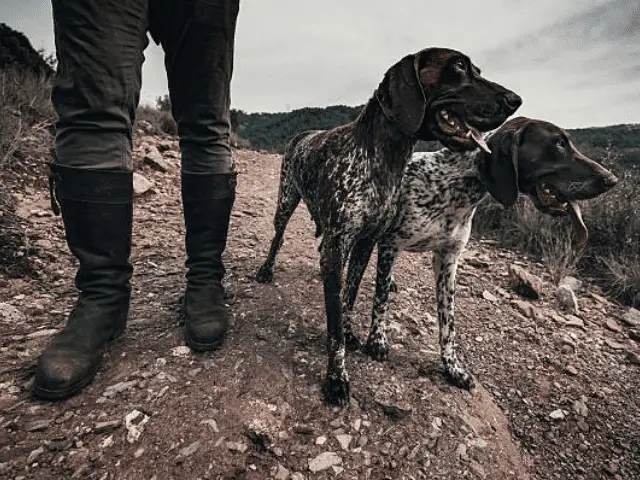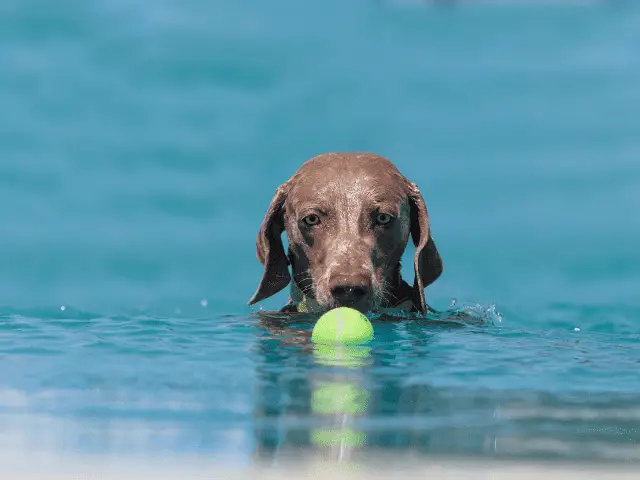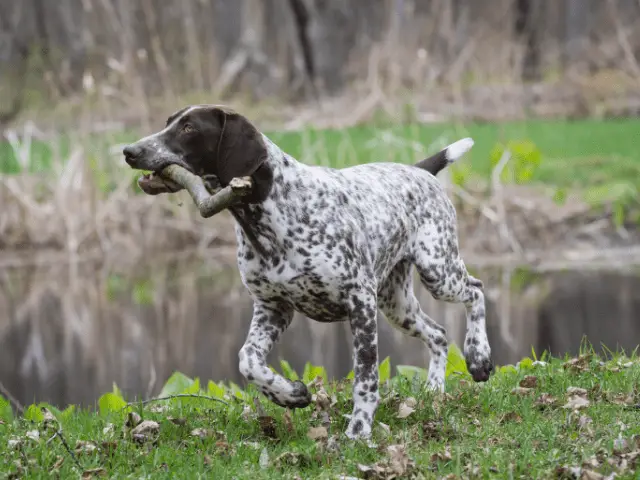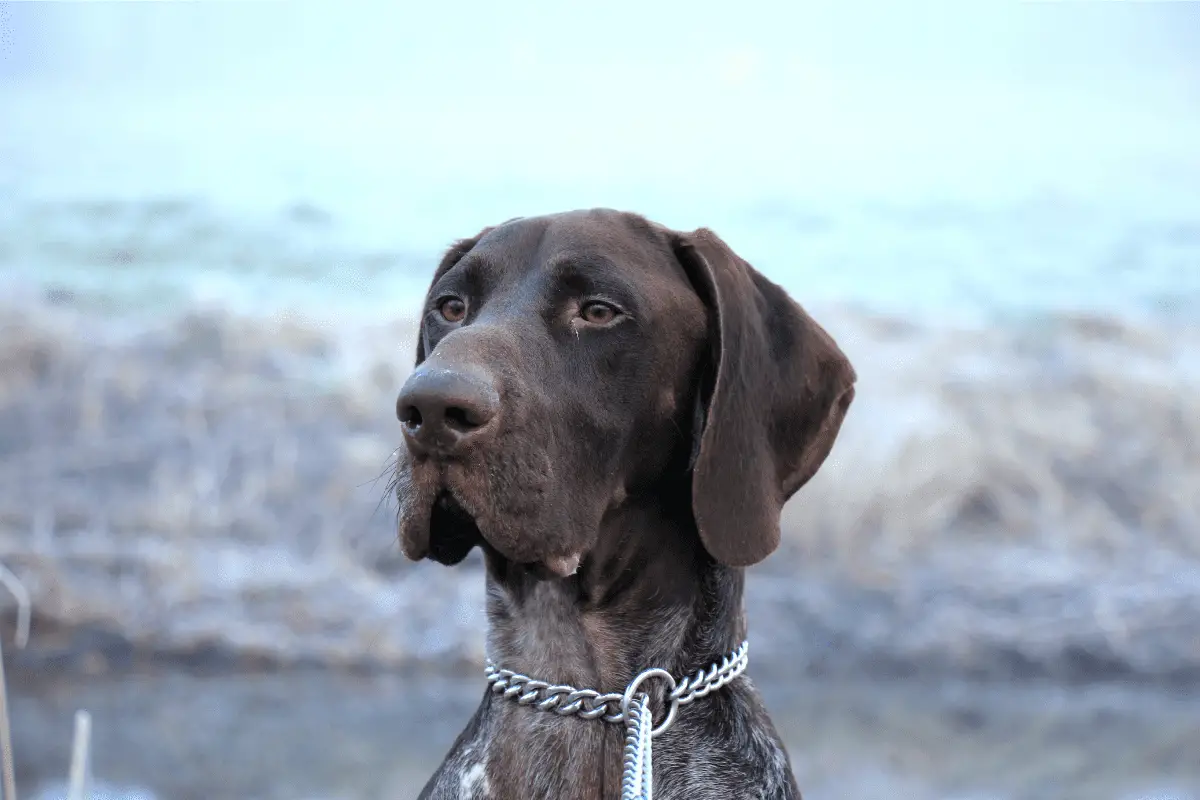Spending time outdoors has been proven to improve mental health and overall wellbeing and adding a canine companion to your travels is a great way to make hiking even more fun.
Just like people, dogs enjoy a variety of different activities and for hikers considering bringing a canine companion along for the adventure, it’s important to understand the breed and the best conditions for each individual dog.
German Shorthaired Pointers, sometimes simply referred to as Pointers or GSP for short, are the perfect trail companion for avid hikers and trail runners due to their high energy and trim physique, affectionate personality, and affinity for the outdoors. Understanding the breed, their health considerations, and what types of activities they excel at will create an ideal lifelong hiking buddy.
This article contains affiliate links. If you make a purchase through one I may receive a commission.

Although German Shorthaired Pointers are a relatively healthy breed with an average lifespan of 10 to 12 years, they may be prone to a few inherited conditions that may make hiking more challenging or impossible if undiagnosed or left untreated.
Like all dogs, GSPs should receive annual veterinary visits to ensure they’re up to date on vaccinations and healthy enough for physical activity.
Bone & Joint Diseases
German Shorthaired Pointers are prone to developing bone and joint issues known as elbow or hip dysplasia . In affected dogs, irregular growth of the ball and socket joint causes the femur and the adjoining socket of the pelvis grow at disproportionate rates, resulting in laxity of the joint leading to degenerative joint disease or osteoarthritis
. In affected dogs, irregular growth of the ball and socket joint causes the femur and the adjoining socket of the pelvis grow at disproportionate rates, resulting in laxity of the joint leading to degenerative joint disease or osteoarthritis .
.
While appropriate breeding habits and health testing can rule out this condition in some dogs, it’s important to have a thorough veterinary exam before starting hiking and to stop if your dog displays any symptoms of pain during hiking such as limping, lethargy, or being slow or unable to rise after periods of activity.
For GSP puppy owners, feeding a balanced diet for each stage of life, adding joint support supplements, and avoiding strenuous exercise during adolescence can further decrease the odds of elbow or hip dysplasia later in life.
Cardiac Diseases
German Shorthaired Pointers have been shown to be disproportionately affected by a cardiac condition known as aortic stenosis, which is a genetic condition causing narrowing at the base of the aortic valve of the heart.
which is a genetic condition causing narrowing at the base of the aortic valve of the heart.
Blood flow to the heart is obstructed in dogs diagnosed with this condition which can cause a heart murmur, exercise intolerance, fainting episodes, or sudden collapse and death.
While appropriate breeding habits and health testing can rule out this condition in some dogs, it’s important to have a thorough veterinary exam before starting hiking to ensure your dog is healthy before hiking. Most dogs diagnosed with this condition live 5-7 years on average and should refrain from prolonged physical activity.
Pointers have Boundless Energy
As a member of the sporting class, German Shorthaired Pointers are highly active dogs that require ample physical activity each day. This medium size breed has a slender body type with high endurance and stamina, making them ideal running partners for trail runners or avid hikers.
Healthy, well-conditioned Pointers have high endurance and stamina when it comes to physical activity and can enjoy hiking up to 15 miles on the trail.
When hiking long distances, it’s important for owners to be prepared with plenty of supplies for their pup like adequate amounts of water, travel bowls, a collar with easy to read identification tags, a leash and harness, and training aids.
Pointers Excel at Swimming

For hikers that enjoy incorporating water activities into their hikes, this breed makes the ultimate companion due to their water-resistant coat, natural affinity for water, and strong swimming skills. Originally bred for hunting, Pointers are no stranger to water and will immediately take to swimming as one of their favorite pastimes.
Even though most German Shorthaired Pointers are generally natural born swimmers, owners should practice appropriate water safety habits like introducing pets to swimming at an early age, providing direct supervision when swimming, teaching water safety commands, and investing in canine life jackets or other water safety tools.
like introducing pets to swimming at an early age, providing direct supervision when swimming, teaching water safety commands, and investing in canine life jackets or other water safety tools.
Additionally, owners should ensure their dogs have plenty of fresh water available to avoid the potential of drinking saltwater or water from contaminated lakes or rivers.
Pointers Crave Mental Stimulation
This highly intelligent breed is infamous for their mischievous ways like chewing on shoes and other household items, when not receiving a healthy dose of mentally stimulating activities.
German Shorthaired Pointer owners should be committed to providing their dog with daily mentally stimulating activities such as nosework, agility, hunting, and obedience training, which can easily be incorporated into a hike.
For young German Shorthaired Pointers or new rescue dogs, hiking is the perfect opportunity to work on leash manners and obedience while exposing them to a number of new and exciting stimuli to provide them with adequate socialization.
As a breed that is generally friendly with other dogs, GSPs greatly benefit from supervised playgroups with other dogs which provide both physical and mental stimulation while helping them learn manners from other dogs.
German Shorthaired Pointers are Great Off Leash

Although each dog is different, most German Shorthaired Pointers do very well when let off leash during a hike. Due to their affectionate personality, most Pointers instinctively tend to stay close to their owners, but their high prey drive and headstrong demeanor necessitate recall training during their younger years.
Before making the decision to hike with an off leash dog, owners should consider their pet’s personality and training level, trail rules and guidelines, and hiking conditions including daylight time, weather, and familiarity with their surroundings.
It is not recommended for puppies, newly adopted dogs, dogs with medical conditions, or untrained pets to be off leash unsupervised.
Pointers Prefer Mild Climates
Although this breed originally hails from Germany where they endured rough winters, their short hair coat makes them better suited to milder climates. Most German Shorthaired Pointers will get cold at temperatures below freezing, but the addition of cold weather aids and limiting the amount of time spent outside in cases of severe weather can greatly reduce the risk of hypothermia in GSPs.
in GSPs.
When hiking in cold weather, owners should practice cold weather best practices including staying away from icy terrain, investing in canine hiking gear like snow boots and properly fitted winter coats, and ensuring your dog is healthy before setting off on an adventure.
When on the trail, owners should be prepared for emergency situations with supplies like extra water, dry blankets, medications, and emergency contacts.
On warmer days, German Shorthaired Pointers are happy to spend plenty of time outside, but owners should follow warm weather pet safety techniques allowing plenty of rest on hot days, offering water frequently, and staying in shaded areas along the trail.
A good rule of thumb when hiking in warm weather is if it’s too hot for you, it’s too hot for your dog and they should be left at home.
Camping with German Shorthaired Pointers
German Shorthaired Pointers can make excellent companions for hikers setting out on multi-day excursions or camping retreats.
Although Pointers easily adapt to new situations like the changing environment that comes along with camping and their friendly demeanor helps them make human and canine friends along the trail, this doesn’t always bode well if any unwanted wildlife approaches the campsite.
Although camping is a great way to spend time working on proper socialization techniques , Pointers may require extra supervision in areas where dangerous wildlife may pose a threat. When camping, it is recommended that GSPs are not left unattended, especially after nightfall.
, Pointers may require extra supervision in areas where dangerous wildlife may pose a threat. When camping, it is recommended that GSPs are not left unattended, especially after nightfall.
High Elevation Hiking with German Shorthaired Pointers
Like all humans and other mammals, dogs can be prone to altitude sickness at elevations greater than 8,000 feet. and attempting a high elevation hike with your German Shorthaired Pointer before they are properly trained and acclimated may result in a serious, life threatening medical condition.
at elevations greater than 8,000 feet. and attempting a high elevation hike with your German Shorthaired Pointer before they are properly trained and acclimated may result in a serious, life threatening medical condition.
Elevation hikers should consult with their veterinarian before attempting high elevation hikes with their GSP and ensure they know the risks of high altitude hiking for themselves and their pets before hitting the trail.
for themselves and their pets before hitting the trail.
Symptoms of altitude sickness in pets include labored breathing, nausea/vomiting, excessive panting, pale gums, increased heart rate, and collapse. Pointer owners should always bring plenty of water for their pets when hiking high elevations as higher altitudes can quickly cause pets to become dehydrated.
With proper training techniques, German Shorthaired Pointers can make an ideal trail partner for solo hikers that enjoy an active lifestyle and long hikes. ACDs are athletic, highly intelligent dogs that can keep their owners safe and happy while building memories on the trail that will last a lifetime.
Have More Dogs in Your Pack?
If you found this article helpful, I encourage you to check out some of our other hiking breed guides like Golden Retriever and the Australian Cattle Dog just to name a few!

